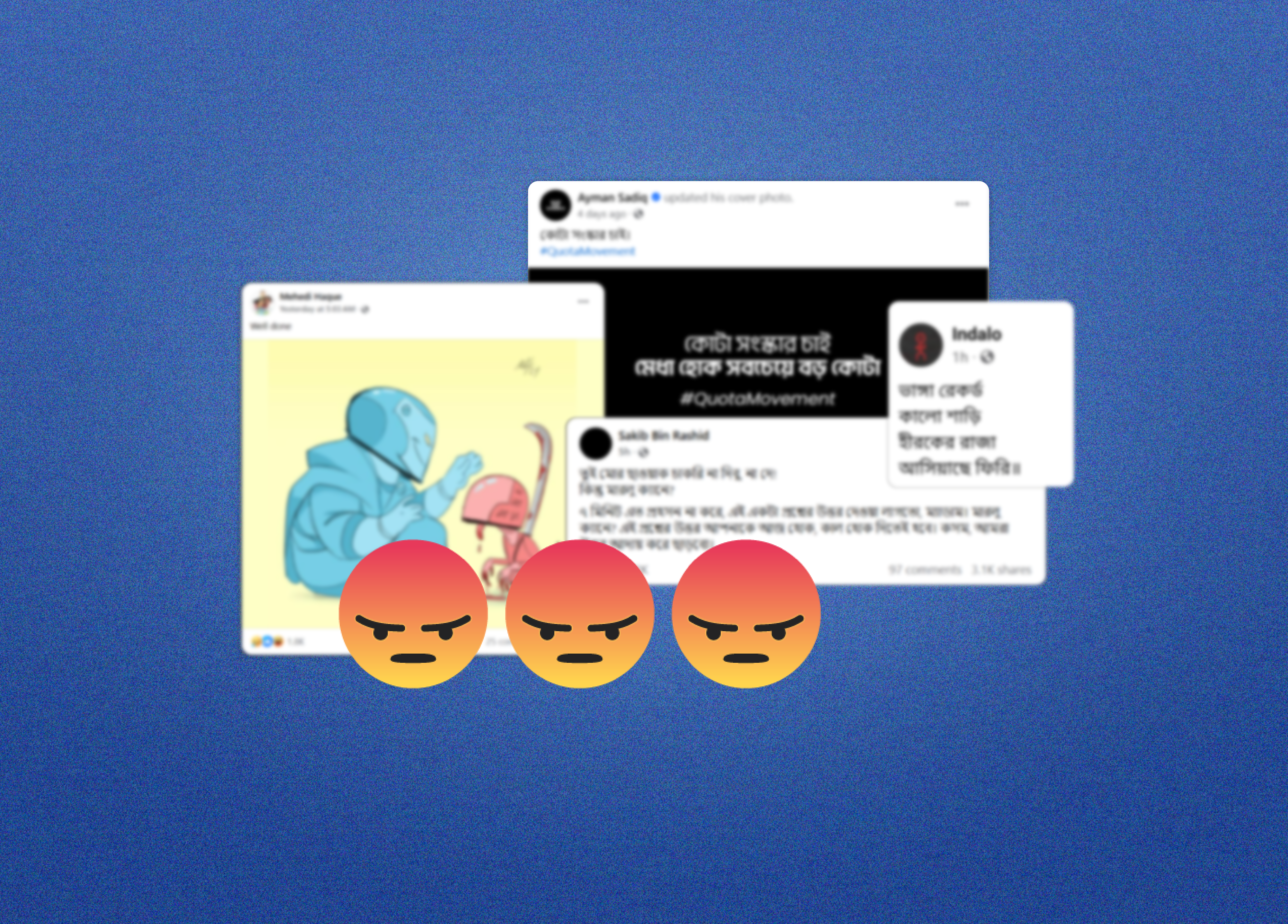
Following days of violence, Sheikh Hasina addressed the nation on Wednesday. But her speech was met with open mockery and derision by the protesters and their supporters.

Sheikh Hasina, who has been in power for 15 uninterrupted years through widely discredited elections, called for a judicial investigation into the violence, citing alleged attacks on her own Chhatra League members by students.
“Terrorists intruded into the protests and created the conditions for conflict and anarchy,” she said, appearing to blame students for the violence. “Those involved in such incidents will be identified and punished accordingly.”
However, the deaths of six people are widely attributed to police crackdowns. In one instance, police officials opened fire on a young student near a university campus in Rangpur. News footage shows the unperturbed police firing at close range, resulting in the death of Abu Sayeed, a student at Begum Rokeya University, which ignited intense reactions on social media.
‘Unfair quota system’
The students were protesting against Bangladesh’s quota system, which reserves more than 50% of public jobs for a small portion of the population, including 30% for descendants of certified freedom fighters, a tiny segment of society widely seen as supporters of the Awami League.
According to some counts, there are around 189,000 freedom fighters in the country, a number inflated by alleged fraud and forgery and still a fraction compared to the country’s population of 170 million.
Hasina defended the quota system at a press conference earlier, arguing that she would prefer descendants of freedom fighters over those of razakars, local collaborators of the Pakistani military in the 1971 war.
Critics said this dichotomy was false and equated almost the entire population with those who actively collaborated with the Pakistani military. The comments sparked widespread anger and fury, leading students to openly call Hasina an autocrat, a rare occurrence in the country.
“Who are you? Who am I? Razakar, Razakar. Who said so? Who said so? Sairachar, Saiarachar,” some protesters chanted, according to posts reviewed by Netra News, using the Bengali word for autocrats.
Throughout Monday and Tuesday, supporters of the ruling party argued that the protesters’ adoption of the term razakar exposed their anti-liberation sentiment, before police and Awami League’s student wing members descended upon the protesters across the country. “The way they chanted as being razakars — as if we don’t already know who they are,” said Shahriar Alam, an Awami League MP and former minister of state for foreign affairs, on Facebook.
In Wednesday’s address to the nation, Hasina was widely understood to be trying to calm tensions. Instead, she was viewed as repeating her routine talking points of widespread development during her rule, her personal tragedy and alleged conspiracy by the opposition.
In response, some celebrities, usually muted on sensitive topics such as Hasina and those in her inner circle for fear of reprisals, have taken to social media to criticise her.
Influencers speak out
On Facebook, the rock band Indalo, which includes top rock artists, wrote in Bengali shortly after Hasina’s TV appearance:
“The Diamond Monarch
Has returned anew
Repeating a broken record
Wearing a black saree”
Although they did not explicitly refer to Hasina, the “Diamond Monarch” is widely recognized as a reference to the autocratic character in the dystopian film Heerak Rajar Deshe by Academy Award-winning Bengali filmmaker Satyajit Ray.
Sina Hasan, a musician with the band Bangla Five, said he would boycott the ‘Joy Bangla Concert’ organised annually by an offshoot of the Awami League party. “Please do not invite me to this sycophantic ‘crowd-pleasing’ concert as an artist or an audience member,” he wrote in a Facebook post that garnered more than 24,000 mostly-supportive reactions.
Sakib Bin Rashid, an influencer with more than 100,000 followers on Facebook, said, “‘If you didn’t want to appoint my son in jobs, don’t. But why did you kill him?’ Instead of the farcical act for seven minutes, you should have answered that question, madam.”
He was referring to the statement of the mother of a killed student, insisting that Hasina should have addressed that question in her speech to the nation. “You will have to answer this question today or tomorrow. Swear, we will get you to answer this question,” he added.
Ashfaque Nipun, the celebrated director of the widely popular TV show Mahanagar, simply noted, “Drama.”
Mehedi Haque, a top cartoonist at New Age newspaper, drew a cartoon depicting a female figure resembling Hasina lending her affection to a man wearing a helmet, a well-known reference to the helmet-wearing Chhatra League members, with his hands dipped in blood.
Shezan, a hip-hop band, has released a fresh track urging the public to “speak up.”
“Your brothers and sisters die in the street, where’s your effort to save them,” they rapped, garnering more than 200,000 reactions on Facebook alone.
On YouTube, the track received more than 30,000 likes.●
Aaqib Md Shatil is a researcher and a contributor to Netra News.
source : Netra News
